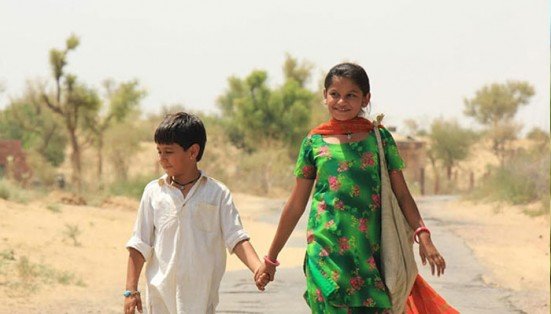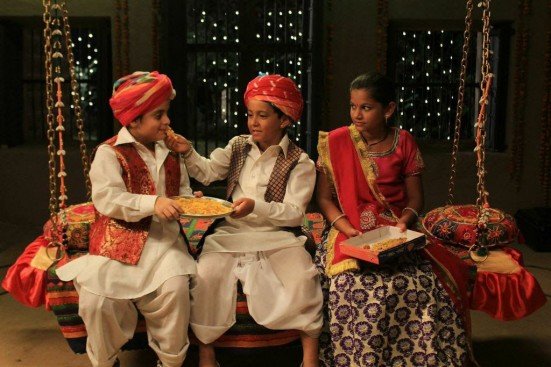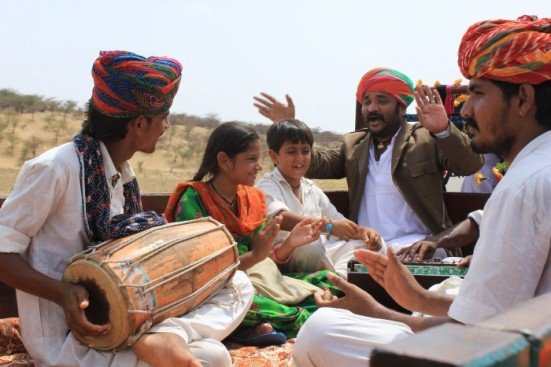
Dhanak (Rainbows), directed by Nagesh Kukunoor, has been voted Best Film at the Berlin Film Festival 2015 and has also been one of the TIFF Kids Selection of Films. It also recently premiered in Toronto. During this period, we had the chance to interview Nagesh about his film.
Dhanak is about a girl named Pari and her efforts to restore her brother Chotu’s eyesight. To do this, they cross the Rajasthani desert in the quest for Shah Rukh Khan, who supports eye donations. What they encounter along the way are several unexpected twists.
Minority-Review’s Swati Sharan has a chat with Nagesh Kukunoor about the film.
What made you choose the script?
Well, sometimes, it’s like the script chooses you. I was actually planning on making another feature after Laxmi. I had a part of the script written for Dhanak but I wasn’t planning on it being the next film. But when Manish Mundra, the producer, met me as I was pitching this other film, he just heard this line about two kids, which was just mentioned in passing as I was leaving. Like oh ya, I have this other sweet little film about these two kids who walk across Rajasthan to help the little one get his eyesight back. And he just latched on to it saying, “Let’s do this one please.” And the film was committed to someone else. And I had to extricate it from them and then do it with Manish. But you know that’s how films get made. So I was planning on doing something else but just went with this.
Are these characters based on real people?
No. Absolutely not. It was a story idea a friend had for an advertisement. Eventually, nothing came of the ad. The idea was lying around for a couple of years. At one point, it was something that kind of resonated with me. And I only later came to find out what it was and why it was. I just asked him one day if it was okay for us to use the script? He was like “Ya, by all means, go for it.” So the film is literally and metaphorically a journey. The beginning and the end could have been an anywhere sort of thing. It didn’t really have a format. So I just kind of went with the flow and I wrote the story and I clearly remember for the boy that’s blind that the world is really not such a bad place. And after coming out after something as horrific as Laxmi, it almost seemed as if this was an antidote to all that bad stuff bouncing around. It just kind of happened.
So it’s a part of your imagination…
It’s not always necessary that the results are good but sometimes that’s how the best stories are told.

A scene from Dhanak
What’s it like working with young children vs. experienced actors like Naseeruddin Shah?
They come with their challenges but I made a film with children back in 1998-99. And then I swore I would never make a film with children again! Not for any other reason other than the fact that it takes a different kind of handling. I don’t have kids of my own. It’s always nice when you can have a good time with kids and then give them back to their parents. But when you’re dealing with a film then in an indirect way, you have got to be a parent to them for a period of a month and a half. That’s altogether another thing. But now all my fears are completely unfounded because these kids were something else. In that kind of insane Rajasthani heat, they were still smiling. They were just awesome. Like I’ve said many times before, I can take the credit for casting them as actors. But I can’t take any credit for them being good human beings and being just troopers and not cliched children throwing tantrums. Child actors can sometimes be very difficult. All the shooting comes to a halt trying to get the kid ready, in the right mood. But here there was nothing like that. I dealt with them as professionals and they behaved as professionals. It was fantastic.
So I guess you wouldn’t have these fears with someone like Naseeruddin Shah. But like you were saying, each has its own challenges. So I was just curious. Naseeruddin Shah wouldn’t probably do what children would typically do in terms of behaviour patterns, so what could be the challenge?
(Laughing) Trust me, a lot of actors can sometimes be more difficult than kids. What I mean by both bringing their set of challenges is with trained professional actors, you can work on scenes in many different ways. You can sometimes find agreements or disagreements. You have to work through a lot of scenes. With kids, when it’s going well, they’re going purely on instinct. They’re not trained in the Bollywood pantheon of acting, which is horrendous. The whole TV conditioning teaches kids to be precocious. But if they don’t have that, they go purely on instinct. It can sometimes produce the most amazing results. Once the kids found the mental space, which took the first 3 or 4 days, they were off and running.

A scene from Dhanak
So do you think kids have less baggage perhaps? As adults maybe we would take too much time to think about it and maybe kids don’t think so much about it?
Absolutely. The girl has done a reasonable amount of television. Even though she was a good actress, there was some degree of conditioning of acting a certain way. But like I said, all these children are trained to act a certain way in the Hindi film line. They’re never allowed to be themselves. So in order for them to understand what it takes to be themselves in front of the camera, it takes a little time. Once that preconditioning drops, you’re off and running. Because they’re just reacting instinctively to every situation.
So do you find art films don’t work as well in India as they do in the West?
They obviously don’t. The market is limited so one of the things that I’ve always done is to try and handle both art and commerce. My films blend somewhere in between. I’ve done well at the box office with several of my films for the simple reason that it’s not an art ‘art’ film. Of course, it doesn’t have a Bollywood song and dance. So I can’t reach out to a wider audience but I can still manage to do relatively well doing the kinds of films I believe in. I think it just comes down to the sensibilities and people can argue about sensibilities on an anthropological level. One can argue about it socially or the way we’re set up. That’s a bigger argument. Why have musicals survived the way they have in India and virtually nowhere else? When we talk about sensibilities, the simple thing with Indian films is that there’s music wall to wall. We’re not good with silences. It has to do with the way most of us live in India. There’s virtually no place where there’s silence in the city till way out in the boondocks. So if a movie demands the complete lack of sound, it makes the person restless. So you bring in the music, the emotion. Everything is larger than life. You can trace it back to when we were used to the stage. We’ve never moved away from that. So everyone’s got a million reasons and so do I. But when you have that kind of set up, to argue against that is difficult.
Added to that, our lives are very herocentric. The caste system is very hierarchical. So we love the concept of heroes. So even if the movie’s entertaining without heroes, you’re going to have alot of difficulty finding the release to get the kind of excitement that’s demanded. The crazy thing is that people living in the West are moving to the event film, which India always had. Bollywood keeps making bigger and bigger films that have all become event films. Now everything’s got to be an event film. It’s got to be huge. India has always had it that way. There are five or six heroes ruling the roost and then give or take two or three films from each other and then they have the year covered.
Do you also think art films don’t do as well in India because there’s more disparity relative to the West? Might serious films work where there’s more affluence?
It’s also about exposure. Like even European art films don’t do as well in the U.S. The Europeans look down on the U.S. film market as crude and crass. We’re like, we’ll take anything the U.S. has to offer because you’re a step above us because of the avenues for getting your films shown and stuff like that. It very much has everything to do with sensibility. So it clearly comes down to no right or wrong. It’s just sensibility. So take Dhanak for instance. In the entire film, the kid cries for one brief second when his sister’s knocked out. I guarantee if you give this to another film maker and ask them to make it in a commercial or Bollywood setup, you’re going to have this kid bawling all over the place. You’re going to have close ups. You’re going to have tears. You’re going to have music blasting. But that’s what works with the audience. And they’ll all be weeping with them. And it’s perfectly okay. It’s very important that if you create that kind of thing, you need to understand what the sensibility of the audience is. I don’t, because I would be disingenuous as a filmmaker if I was making my characters do that and I don’t believe in it. If I believed in it and said,’Oh you just have to break down and bawl’, I would have them do it. But for me as a filmmaker, that doesn’t make sense. It’s about my sensibilities. It’s as simple as that.

A scene from Dhanak
So how have you successfully tackled a serious story in a light way?
If you’re specifically referring to Dhanak, there are several different ways you can go with the story. If you look at all 14 of my films, they all have happy endings. On some cheesy level, I am one of those die hard optimists. It’s nice for people to walk out of the theatre with a smile. I find nothing wrong with that. So in all of my films, I’ve cached the message in a light-hearted way whether people get it or not. Atleast people have a good time. This is the second film I’ve made on disability issues. The first was Iqbal. And this is how it works sometimes. Iqbal was eventually written as a chapter in 8th standard textbooks studied throughout the nation. So that was a great way to get the disability message across that everyone’s equal and differently-abled and so on. And it was only because it was a nice happy film. If that was some deep film with many layers about what it means and all that, I don’t think the film would have been as acceptable. So what I have done in my work is not address the disability. I am not saying you should ignore it either.
Do you mean not to make the disability the focus?
Right. I have friends who are in wheelchairs. Every time we meet up we’re not only going to talk about the disability. We’re going to behave as normal friends. It’s the same thing when you bring it on the screen and you constantly go into making it the issue; the goal of normalising it vanishes. In both films, I chose to deal with it in the same way. So I touch upon it but don’t make it the central issue. This is a film that’s about believing that the world is actually a nice place. Kids have that amazing ability to see that and that is the mother of all cliches. But for myself as a cynical twenty-something-year old man, it was nice to go down that road where people trusted each other. In some ways, it’s like going back to the India in my head, the one that’s been in there since I was a child.
For more interviews click here.



0
comments